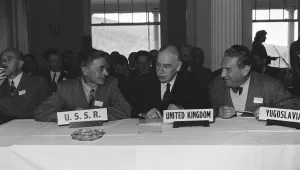International Security is America's leading peer-reviewed journal of security affairs.

Summary
When aligned states consider disclosing secret information about military plans to use force, the state initiating these plans may choose among four information-sharing strategies: collusion, compartmentalization, concealment, and lying. Three main considerations shape its decision: potential costs of deception, the partner’s intentions, and the partner’s capabilities. Case studies of Israel, Britain, and France's decision to use force against Egypt during the Suez Crisis; Israel's 2007 bombing of Syria's al Kibar reactor; and Israel's deliberations whether to attack Iran's nuclear reactor illustrate how states choose among information-sharing strategies.
Melinda Haas and Keren Yarhi-Milo, "To Disclose or Deceive? Sharing Secret Information between Aligned States," International Security, Vol. 45, No. 3 (Winter 2020/21), pp. 122-161, doi.org/10.1162/isec_a_00402.





